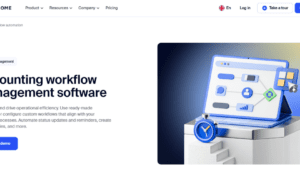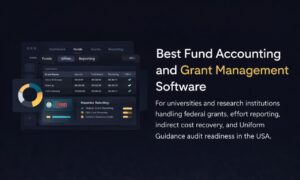Do you have a keen eye for details? Are you fascinated by numbers and financial data? If so, then joining the ranks of financial auditors might be just the right path for you! In this blog post, we will unveil the key responsibilities of a financial auditor and shed light on what it takes to excel in this exciting profession. Whether you’re an aspiring accountant or simply curious about how businesses ensure their finances are in tip-top shape, grab a cup of coffee and get ready to dive deep into the world of financial auditing.
Introduction to Financial Auditing
As a business owner, you are likely familiar with the term “financial audit.” However, you may not be as clear on what a financial audit entails and what role a financial auditor plays within your company. In this blog post, we will provide an introduction to financial auditing and unveil the key responsibilities of a financial auditor.
What is Financial Auditing?
Financial auditing is the process of examining an organization’s financial reports and statements to ensure that they are accurate and compliant with applicable laws and regulations. The financial auditor’s role is to express an opinion on whether the financial statements fairly represent the organization’s financial position, results of operations, and cash flows.
Why is Financial Auditing Important?
Financial auditing is important because it provides assurance that an organization’s financial statements are reliable. This in turn helps build trust between the organization and its shareholders, creditors, and other stakeholders. Additionally, financial auditing can help uncover fraud or other irregularities within an organization.
What are the Key Responsibilities of a Financial Auditor?
The key responsibilities of a financial auditor include: Planning and performing audits; Expressing opinions on whether financial statements are fairly presented; Identifying internal control weaknesses; Recommending improvements to internal controls; and Reporting findings to management.
As you can see, financial auditors play a vital role in ensuring the accuracy of an organization’s financial statements and promoting confidence in the organization among its stakeholders. If you have
Basic Responsibilities of a Financial Auditor
When it comes to financial auditing, there are certain basic responsibilities that every auditor must adhere to. These responsibilities include:
– Assessing the organization’s financial statements and records
– Identifying any irregularities or errors in the financial statements and records
– Investigating the causes of any irregularities or errors identified
– Reporting findings to the organization’s management team
In addition to these basic responsibilities, financial auditors may also be responsible for assessing the internal control systems of an organization and providing recommendations for improvements.
Types of Financial Audits
There are three types of financial audits: operational, compliance, and financial.
Operational audits assess whether an organization is working efficiently and effectively. Compliance audits check whether an organization is following specific rules and regulations. Financial audits review an organization’s financial statements to see if they’re accurate.
Working with Regulatory Agencies and Stakeholders
Auditors play a critical role in the financial reporting process, providing an independent check on an organization’s financial statements. They work with regulatory agencies and stakeholders to ensure that financial statements are accurate and compliant with applicable laws and regulations.
Auditors work closely with management to understand the organization’s business and its internal controls. They also assess risks and review contracts to identify potential areas of non-compliance. In addition, auditors provide guidance on accounting policies and procedures, and help ensure that financial statements are prepared in accordance with generally accepted accounting principles (GAAP).
The audit process typically begins with a planning phase, during which the auditor determines the scope of the audit and develops an audit plan. The fieldwork phase is when the actual audits are performed, and includes testing of internal controls and compliance with laws and regulations. After the fieldwork is completed, the auditor compiles their findings into a report which is then issued to management.
Auditing Standards and Techniques
An auditor’s most important responsibility is to plan and perform audits in accordance with Generally Accepted Auditing Standards (GAAS). GAAS provide a framework for conducting high-quality audits that protect the public interest.
In order to comply with GAAS, auditors must have adequate technical training and experience. They must also be independent of the entities they audit, and must maintain objectivity and professional skepticism throughout the audit process.
Auditors use a variety of techniques to gather evidence during an audit. These techniques include observation, inspection, confirmation, and analytical procedures. The type of evidence gathered depends on the nature of the audit objective. For example, if the objective is to test for compliance with a specific law or regulation, the auditor would likely focus on collecting documentary evidence. If the objective is to assess the risk of material misstatement in financial statements, the auditor would likely use analytical procedures and confirmations.
No matter what techniques are used, auditors must exercise professional judgment in evaluating the evidence collected and form an opinion on whether the financial statements are free of material misstatement. This opinion is expressed in an audit report.
Common Areas of Audit Focus
When it comes to financial auditing, there are a few key areas that tend to be of particular focus. This includes things like cash flow, revenue and expenses, asset management, and compliance with laws and regulations. Often times, an audit will start with a review of documentation and financial statements in order to get a better understanding of the organization’s overall financial picture. From there, the auditor may choose to perform various tests in order to verify information and ensure accuracy. Some common areas of focus during an audit might include:
– Reviewing bank statements and transactions
– Analyzing account receivable and payable records
– Testing inventory levels
– Examining expense reports
– Investigating compliance with laws and regulations
-Calculating depreciation rates
Ultimately, the goal of any financial audit is to provide an objective opinion on the organization’s financial statement. By taking a close look at all aspects of the organization’s finances, auditors can help identify any potential problems or areas of concern.
Ethical Principles for Auditors
When it comes to auditing, there are a few key ethical principles that auditors must follow in order to ensure that they are conducting themselves in an ethical manner. These principles include being independent, objective, and honest in their audit approach and findings. Additionally, auditors must maintain confidentiality and use due diligence when performing an audit.
As independent professionals, auditors must avoid any conflicts of interest that could bias their opinion or judgment. They must also be objective in their approach to the audit, ensuring that they’re not swayed by personal beliefs or agendas. Furthermore, honesty is critical in the world of auditing – auditors must be truthful in their communications with clients and stakeholders, and they must report any findings accurately and without embellishment.
Confidentiality is another important ethical principle for auditors. Auditors must respect the confidential nature of the information they obtain during an audit, and they must not reveal any non-public information without prior approval from the client or affected party. Due diligence is essential in all aspects of an auditor’s work – from planning and conducting the audit to reporting on findings. Auditors must exercise professional care and skill when performing their duties, and they must take all necessary steps to ensure the accuracy and completeness of their work.
Conclusion
Being a financial auditor is an important and challenging role, requiring knowledge of accounting principles, audit standards, regulations and ethical requirements. This article has provided the key responsibilities of a financial auditor that you should be aware of in order to launch your career in this field. With practice and experience, it is possible to build expertise in auditing skillset and gain insights from working with complex financial matters. If you are interested in becoming a financial auditor, make sure you familiarize yourself with the role’s primary responsibilities before taking any steps towards achieving your goal.



































